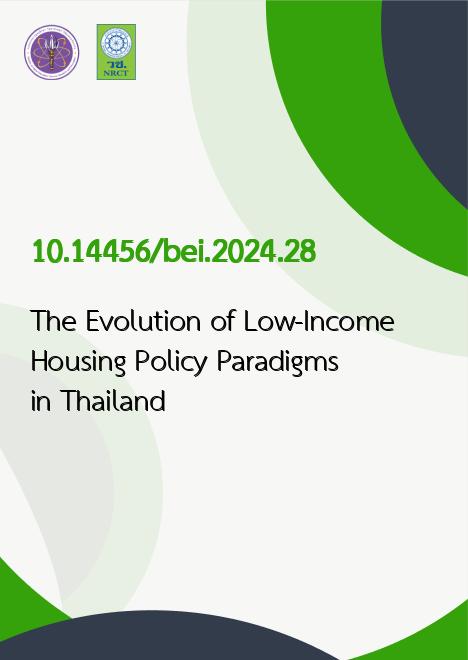
|
The Evolution of Low-Income Housing Policy Paradigms in Thailand |
|---|---|
| รหัสดีโอไอ | |
| Creator | Puritat Chaiyaseth |
| Title | The Evolution of Low-Income Housing Policy Paradigms in Thailand |
| Publisher | คณะสถาปัตยกรรมศาสตร์ |
| Publication Year | 2567 |
| Journal Title | วารสาร สิ่งแวดล้อมสรรค์สร้างวินิจฉัย (Built Environment Inquiry – BEI) |
| Journal Vol. | 23 |
| Journal No. | 3 |
| Page no. | 176-193 |
| Keyword | Low-Income Housing Policy, Policy Paradigms, Supply-Driven, Demand-Driven |
| URL Website | https://www.tci-thaijo.org/index.php/arch-kku |
| Website title | Built Environment Inquiry Journal Faculty of Architecture Khon Kaen University, Thailand |
| ISSN | 2651-1185 |
| Abstract | Despite sustained policy interventions, Thailand continues to face significant challenges in providing adequate and affordable housing for low-income communities. The objective of this study is to explore and analyze the paradigms underlying Thai low-income housing policy, an aspect that has been largely underexamined. These paradigms—defined by specific ideas, values, and beliefs—underpin policymaking processes and have influenced policy effectiveness. Through a qualitative analysis of three case studies—Din Daeng Flats, Klong Toei Slum, and Baan Munkong Projects—this research highlights the coexistence of two contrasting paradigms. The National Housing Authority (NHA) adopts a supply-driven, top-down approach, while the Community Organization Development Institute (CODI) emphasizes a demand-driven, participatory model. Findings reveal that this duality has both hindered policy integration and offered flexibility for adaptation. However, the absence of a unified housing policy for low-income groups exacerbates issues such as land disputes, funding shortages, and limited access to housing. Additionally, the rise of a rights-based paradigm driven by NGOs has shown potential for fostering negotiation and community development but faces barriers from entrenched power structures, particularly around land ownership |